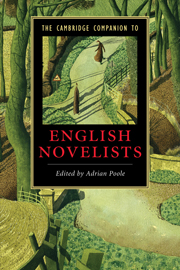Book contents
- Frontmatter
- Introduction
- 1 Daniel Defoe
- 2 Samuel Richardson
- 3 Henry Fielding
- 4 Laurence Sterne
- 5 Frances Burney
- 6 Jane Austen
- 7 Walter Scott
- 8 Charles Dickens
- 9 William Makepeace Thackeray
- 10 Charlotte Brontë
- 11 Emily Brontë
- 12 Elizabeth Gaskell
- 13 Anthony Trollope
- 14 George Eliot
- 15 Thomas Hardy
- 16 Robert Louis Stevenson
- 17 Henry James
- 18 Joseph Conrad
- 19 D. H. Lawrence
- 20 James Joyce
- 21 E. M. Forster
- 22 Virginia Woolf
- 23 Elizabeth Bowen
- 24 Henry Green
- 25 Evelyn Waugh
- 26 Graham Greene
- 27 William Golding
- Guide to further reading
- Index
25 - Evelyn Waugh
Published online by Cambridge University Press: 28 March 2010
- Frontmatter
- Introduction
- 1 Daniel Defoe
- 2 Samuel Richardson
- 3 Henry Fielding
- 4 Laurence Sterne
- 5 Frances Burney
- 6 Jane Austen
- 7 Walter Scott
- 8 Charles Dickens
- 9 William Makepeace Thackeray
- 10 Charlotte Brontë
- 11 Emily Brontë
- 12 Elizabeth Gaskell
- 13 Anthony Trollope
- 14 George Eliot
- 15 Thomas Hardy
- 16 Robert Louis Stevenson
- 17 Henry James
- 18 Joseph Conrad
- 19 D. H. Lawrence
- 20 James Joyce
- 21 E. M. Forster
- 22 Virginia Woolf
- 23 Elizabeth Bowen
- 24 Henry Green
- 25 Evelyn Waugh
- 26 Graham Greene
- 27 William Golding
- Guide to further reading
- Index
Summary
The novels of Evelyn Waugh (1903–66) occupy an unstable place in the canon. On the one hand, they have been disdained for the narrowness of their social range and the coldness, even the cruelty, of their moral temper. On the other hand, even Waugh’s detractors find it hard not to appreciate the prose in which his stories are couched, and which marks him out – in its exactitude, in the curtness of its controlled irony, and in a fanatical pursuit of the mot juste – as what might be termed the last of the Augustans, while rarely retreating into the archaic or subsiding into pastiche. His published letters and journals find him creating, as though by reflex, and as much for his own enjoyment as for that of others, unceasing miniature narratives of comic ferocity; they suggest an author sharpening his knives for the preparation of a feast. Waugh himself, aware of the accusations ranged against him, sought to confound his critics, in the spirit of mischief which underlay most of his public pronouncements, by owning up to the majority of the charges and yielding to others that had not even been levelled. The disingenuity was nicely calculated: ‘I regard writing not as an investigation of character, but as an exercise in the use of language, and with this I am obsessed’, he said in an interview of 1963.
- Type
- Chapter
- Information
- The Cambridge Companion to English Novelists , pp. 407 - 422Publisher: Cambridge University PressPrint publication year: 2009



